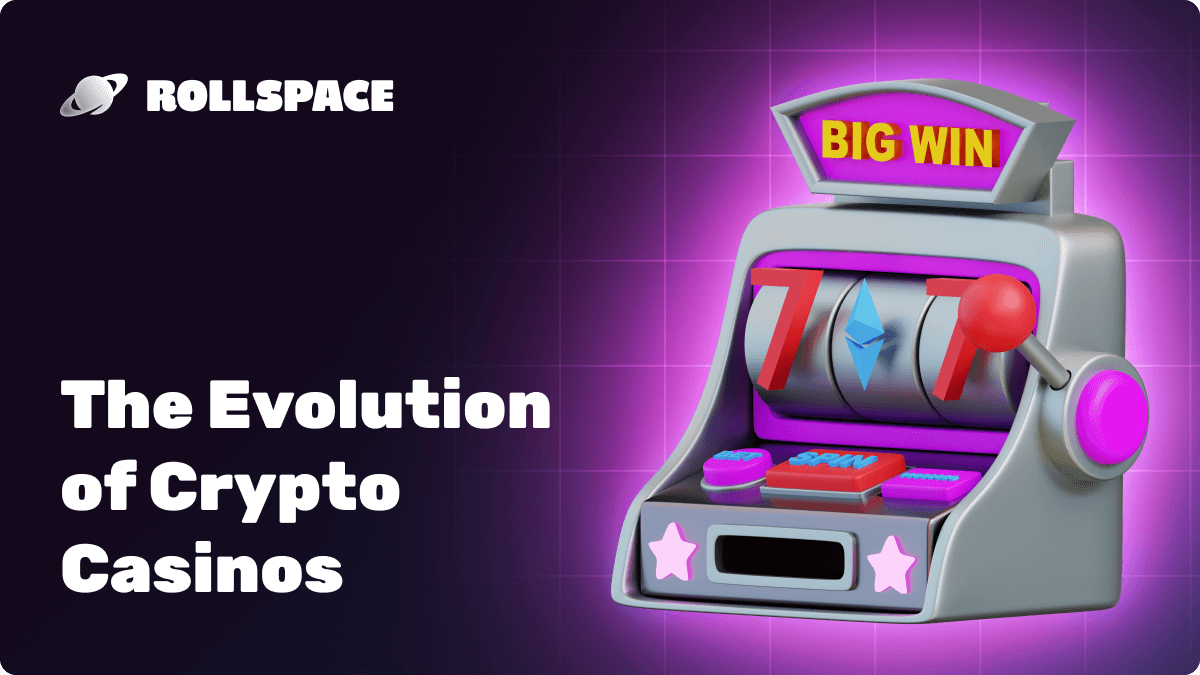Play Games and Earn LUCK.

Play Games and Earn LUCK.


The world of online gambling has undergone significant transformation in recent years, and the rise of crypto casinos have been at the forefront of this change. Unlike traditional online casinos, which rely on fiat currencies and centralized payment processors, crypto casinos allow players to gamble using cryptocurrencies like Bitcoin, Ethereum, and other digital assets to offer a more secure and decentralized gambling experience.
With the increasing popularity of cryptocurrencies, crypto casinos are gaining traction, offering players enhanced privacy, faster transactions, and new opportunities. This article explores the rise of crypto casinos, their advantages over traditional gambling platforms, and their future prospects.

Crypto casinos started as niche platforms, appealing primarily to tech-savvy users and early adopters of digital currencies. However, as more people have recognized the advantages of cryptocurrencies—from lower transaction fees to enhanced privacy—the appeal of these casinos has expanded. Today, crypto gambling offers unique benefits over traditional methods, such as:
With the rise of multi-token platforms that accept not only Bitcoin but also altcoins like Dogecoin and Ethereum, the world of crypto casinos has evolved into a highly dynamic space. This growing sector is redefining the online gambling experience by offering a secure, fast, and user-friendly alternative to conventional online casinos.

One of the defining features that sets crypto casinos apart from traditional online gambling platforms is their use of blockchain technology. At its core, blockchain enables a decentralized, immutable ledger that records every transaction. This technology offers unprecedented transparency and security, both of which are critical in online gambling where trust is a major concern for players.
By leveraging blockchain, crypto casinos provide players with verifiable proof of fairness, reducing the need to rely on third-party audits or blindly trust the casino operator. The rise of crypto casinos can be attributed to the numerous advantages they offer over traditional online casinos. Some of the most significant benefits include:
Unlike traditional online casinos, where players have no insight into how game outcomes are generated, provably fair systems allow players to independently verify the fairness of each game round. These systems use cryptographic algorithms to generate random game results, ensuring neither the casino nor external parties can manipulate outcomes. This is especially beneficial in games like dice, roulette, and card games, where fairness is essential for player confidence.
Blockchain’s decentralized nature enhances the security of transactions. Every cryptocurrency transaction is recorded on the blockchain, making it nearly impossible for hackers to alter or forge payment data. For crypto gambling, this means:
Blockchain also eliminates the lengthy processing times associated with traditional online casinos. As crypto casinos continue to innovate, blockchain technology remains the backbone of these platforms, enabling a trustless, transparent, and efficient gambling experience.

The early days of crypto casinos were dominated by Bitcoin. Many of the first online casinos that accepted cryptocurrency were exclusively Bitcoin casinos. Players were drawn to these platforms because they could gamble with a decentralized currency, free from the restrictions and fees of traditional banking systems.
However, as the cryptocurrency market expanded, so did the options available to both players and casino operators.
Today, many crypto casinos are no longer limited to Bitcoin. They’ve evolved into multi-token platforms, allowing users to bet with a wide range of cryptocurrencies, including:
This shift has dramatically expanded the appeal of crypto casinos, giving players more flexibility in how they fund their accounts and place bets.
For example, Ethereum casinos offer faster transaction times due to Ethereum’s superior network speed, while Litecoin casinos are popular for their low transaction fees. Each cryptocurrency comes with its own set of advantages, allowing players to choose the option that best suits their needs.
One of the key drivers behind the rise of multi-currency crypto casinos is the growing use of altcoins. As more players diversify their crypto portfolios, they expect online casinos to accommodate these new digital currencies. Operators, in turn, have recognized the benefits of offering multiple cryptocurrency options. Not only does this attract a broader audience, but it also helps casinos hedge against the volatility of any single cryptocurrency. If Bitcoin experiences a sudden drop in value, for example, players still have the option to gamble with altcoins that may be more stable at the time.
Multi-token platforms also cater to the growing demand for faster, more efficient gambling experiences. Many altcoins boast quicker confirmation times and lower transaction fees than Bitcoin, making them ideal for players who want to deposit and withdraw funds rapidly. In this way, multi-token platforms are transforming the landscape of crypto gambling, offering both convenience and choice to modern-day players.
The transition from Bitcoin-only casinos to multi-token platforms marks a pivotal point in the evolution of crypto casinos, as it reflects the broader acceptance of cryptocurrencies in general. By embracing a range of digital currencies, these casinos are staying ahead of the curve and meeting the demands of a more diverse and sophisticated user base.
As competition within the crypto casino industry intensifies, platforms are focusing more on enhancing the overall user experience. Players want fast, intuitive, and seamless interactions. Modern crypto casinos have made significant strides in this regard by offering features such as:
One of the key improvements in crypto casinos is transaction speed. Unlike traditional online casinos, which may take several days to process withdrawals, crypto casinos allow for near-instant deposits and withdrawals.
Many platforms now operate as no-KYC casinos, meaning they do not require players to undergo extensive identity verification processes. This is appealing to users who value privacy and prefer not to share personal information. However, it’s important to note that while no-KYC options enhance privacy, they also come with certain risks, such as less regulatory oversight.
Additionally, crypto casinos are embracing gamification to improve user engagement. By incorporating elements like leaderboards, achievements, and loyalty programs, these platforms make the gaming experience more interactive and rewarding. This approach not only keeps players coming back but also enhances their overall satisfaction.

The rise of crypto casinos has transformed online gambling but has also brought new regulatory challenges to the forefront. Unlike traditional online casinos, which are heavily regulated by government bodies, crypto casinos operate in a more decentralized space, often putting them in a legal gray area. While this gives operators more freedom, it also raises concerns about player protection, legal compliance, and responsible gambling.
The regulatory landscape for crypto gambling varies significantly across countries. Some regions, such as the UK and Malta, have embraced the trend with clear regulatory frameworks. These jurisdictions ensure that crypto casinos comply with existing gambling laws while offering some flexibility for innovation. Other countries, like the United States, have stricter regulations, making it difficult for crypto casinos to operate freely without facing legal hurdles. Players in these regions must be cautious and check local laws to ensure they aren’t violating any regulations when engaging in crypto gambling.
A primary concern with crypto casinos is the lack of Know Your Customer (KYC) procedures on some platforms, raising the risk of illegal activities such as a money laundering and fraud. Hybrid platforms, where users can choose between anonymous play or KYC processes for higher withdrawal limits, are emerging to address these challenges.
Another challenge is taxation. Since cryptocurrency transactions can be difficult to trace, tax authorities in many countries are still figuring out how to handle winnings from crypto casinos. Players are responsible for understanding their local tax obligations, as the anonymity of cryptocurrency doesn’t exempt them from declaring their winnings.

As crypto casinos continue to evolve, the integration of emerging technologies like virtual reality (VR), non-fungible tokens (NFTs), and decentralized finance (DeFi) is shaping the future of online gambling. These innovations are poised to enhance user engagement, offer new revenue streams for operators, and introduce more interactive and transparent ways to gamble.
Virtual reality casinos are expected to create fully immersive gaming environments where players can interact with one another in real-time, making the experience feel like a physical casino. Imagine walking into a virtual casino, sitting at a poker table, and playing against other users from around the world—all powered by blockchain technology. This level of immersion adds a new layer of excitement to online gambling, and as VR technology becomes more accessible, more crypto casinos are likely to adopt it.
Non-fungible tokens (NFTs) are also finding their way into the world of crypto casinos. NFTs can be used in a variety of ways, such as digital collectibles, in-game assets, or even as part of loyalty programs. For example, players could earn rare, tradable NFTs as rewards for achieving certain milestones in a casino, or use them to gain access to exclusive VIP games and events. The integration of NFTs offers a new level of ownership and exclusivity, attracting players who are already involved in the world of blockchain-based collectibles.
Another promising trend is the application of decentralized finance (DeFi) within crypto casinos. DeFi allows players to access decentralized lending, staking, and yield farming opportunities directly through the casino platform. Instead of just wagering their crypto, players could stake their assets in decentralized pools to earn passive income, effectively blurring the lines between gambling and financial investment. This offers players a more versatile way to engage with the platform, while also increasing liquidity for the casino.
Furthermore, DeFi could enhance trust and transparency within the crypto gambling industry by eliminating the need for intermediaries. Smart contracts, which automate and enforce the terms of agreements, can be used to manage payouts, betting odds, and jackpot distributions in a fully transparent way. This removes the need for third-party audits or the possibility of casino operators tampering with results, making the gambling process fairer and more efficient.
Laslty, in the future, we are likely to see a greater convergence between traditional iGaming platforms and crypto casinos, as more operators integrate cryptocurrency payment options and blockchain-based features into their offerings.
What are Crypto Casinos?
Are Crypto Casinos Legal?
What is a No-KYC Casino?